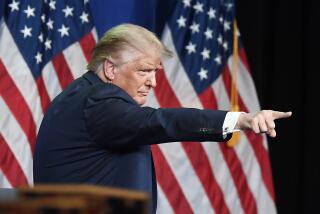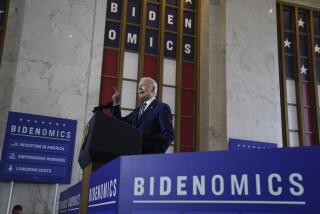Bill (The Man With the Plan) Clinton Builds His Consensus With Populism : Politics: For baby boomers, a generation that planned its whole life, from career to family, planning the national economy is no big deal.
WASHINGTON â Whereâs the Plan? Thatâs what everybody is waiting for. Dozens of reporters are encamped in Little Rock, seizing on every hint, every gesture. They need to report something, anything, about Bill Clintonâs Plan for the Country.
The press is impatient. But the President-elect and his transition team are unruffled. The Clinton organization is nothing if not methodical. The Campaign went according to plan, they argue. And the Plan will go according to plan.
The Plan is the wondrous contraption that will turn the U.S. economy around. It was what the entire election was about.
To get anywhere in the election, you had to have an economic plan. Paul E. Tsongas was the first candidate to figure this out. He published his âCall to Economic Arms,â hawked it on TV and won the New Hampshire primary. Clinton got the message. He put together his plan (âPutting People Firstâ), waved it around and came in second in New Hampshire.
When the press started asking Ross Perot to explain his plan, he decided heâd better get one, too. Perot took a leave of absence from the campaign, published his plan (âUnited We Standâ) and, presto , he was all set to resume the race.
Eventually, George Bush got the idea. He came up with his âAgenda for American Renewalâ in mid-September. But no one paid much attention. A 29-page pamphlet did little to dispel the impression, accumulated over four years, that the Bush Administrationâs real economic agenda was to muddle through. Bush was the no-plan man, and he got clobbered.
Now that Clinton has gotten elected, the world is waiting for him to unveil the details of his Plan. Robert B. Reich, Clintonâs Master Planner, promises the main elements of what he calls the âgrand schemeâ will be completed in time for the economic summit meeting in Little Rock, Dec. 14 and 15. Just a few more days, folks, and youâll have--ta da!--the Plan.
Clinton is consciously following the Reagan model. That means limiting your agenda to one big idea--fixing the economy--and giving it total priority. Clinton says he intends to focus on the economy âlike a laser beam.â
Ronald Reagan did that in 1981. Like Clinton, Reagan took office at a time of economic crisis, and he set out to change the countryâs direction. Remember the drama surrounding the congressional votes on Reaganomics in the summer of 1981? It was all part of an orchestrated public-relations effort, complete with televised speeches from the White House and a massive call-in and letter-writing campaign by voters.
Clinton is seeking to avoid the mistakes that Bush and Jimmy Carter made. Bush had no particular priorities. He got elected on a negative campaign, and he articulated no vision for the country beyond managing the status quo. Bush said he wanted to be a âkinder, gentlerâ President. So Congress beat him up.
Carter had too many priorities. He gave Congress a laundry list of proposals and insisted they were all equally important. Carter maintained a disdainful attitude toward Congress. They should give him everything, Carter said, because he was morally correct and they were sinful. So Congress did what the sinful always do to the morally correct. They beat him up.
Clinton has a problem, however. Recent economic news has been good. Good economic news diminishes the sense of urgency. No urgency, no crisis. No crisis, no Plan.
The transition team recognized the danger immediately. George Stephanopoulos, Clintonâs communications director, called the news of strong third-quarter growth âgood news, but probably not good enough.â Clinton told reporters it âwonât change my long-term plans at all.â In other words, the Plan is still on.
All during the campaign, Bush kept insisting the economy was improving. But voters didnât believe it had anything to do with what Bush was doing because they didnât think Bush was doing anything. Why not? Because he didnât have a plan.
Thatâs why the Clinton people are eager to get their Plan in place. They didnât like it last week when White House spokesman Marlin Fitzwater said, âThe Bush recovery is coming on strong.â They want it to be the Clinton recovery.
Unlike Reagan 12 years ago, Clinton will be operating under a severe constraint--the federal budget deficit created by Reagan. The harsh reality is we canât achieve long-term economic growth without reducing the deficit. That will require some tough choices, like eventual tax increases and spending caps on popular entitlement programs.
To make those choices, a politician needs a base of political support. Reagan had a conservative base--loyal followers willing to âstay the course,â even when his program was not working.
But Clinton is not an ideological leader. He has no loyal following of liberals who will stick with him because he fights for them. Clinton is a consensus-builder. Consensus-building requires a lot of skill and a lot of work, but itâs something Clinton seems to be very good at.
For Clinton, the first step in building a consensus will be next weekâs economic summit meeting. More than 100 business leaders, labor leaders and economists will discuss the new Administrationâs economic proposals. All of it will be televised. Clinton himself will moderate.
Political commentators were horrified when the transition team first announced plans to hold the summit. It sounded like a brainstorming session to give Clinton ideas about what to do. But hadnât Clinton just won the election because he knew what he wanted to do? The summit proposal raised an alarming possibility: Maybe Clinton didnât have a Plan.
Clintonâs transition team immediately backtracked. They changed the concept from a âsummitâ to a âretreatâ and finally a âworking conference.â Of course, the President-elect knows what to do, they said. He simply wants to meet with these leaders to explain his ideas and, as Stephanopoulos put it, âbuild consensus.â
The two key elements in selling Clintonâs Plan are populism and pragmatism.
You probably thought the 1992 presidential campaign was finally over. Brace yourself. Clintonâs campaign manager promises that the President will âmaintain a campaign mentalityâ throughout his term. Clinton plans to take a bus to the Inauguration and open the White House for a public reception. (Will McDonaldâs cater?) They intend to reconstitute the entire campaign in the White House: town halls, 800 numbers, walkabouts and call-in shows, all televised. In other words, a permanent campaign.
The aim is to give people a sense of participation in the Clinton presidency. And build support for his program. Where Reagan relied on conservatism, Clinton will rely on populism.
And on pragmatism. Reagan and his followers were true believers. Clinton and his followers have no faith in theories or ideologies. They are scornful of academic economists and their abstract models. They are disdainful of the âfalse choicesâ posed by liberalism and conservatism.
Clintonâs followers pride themselves in being men and women of action. They know how to get things done. But do they have faith in anything? Of course they do. Like all baby boomers, they place their ultimate faith in themselves .
Baby boomers believe in meritocracy: government by smart people. The model is John F. Kennedy. Clintonâs followers, like Kennedyâs, see themselves as the best and the brightest of their generation, devoting themselves to public service.
The Clinton people believe in plans. They planned their lives. They planned their careers. They planned their families. Now they want to plan the nationâs economy. After four years of Bush, the voters are willing to give them a chance.
Americans distrust plans. They donât like the idea of government, business and labor sitting down and working out a plan for the economy. Most Americans donât know much about economics, but they do know something about human nature.
They know that somewhere deep in the human soul, there is the potential for corruption. When government, business and labor get together, the result will not necessarily be a better economy. They could end up lining each otherâs pockets.
It will not be enough for the Clinton people to be smart. They also have to be incorruptible. The voters will always be suspicious that someone, somewhere, is getting rich on Clintonâs Plan.
More to Read
Get the L.A. Times Politics newsletter
Deeply reported insights into legislation, politics and policy from Sacramento, Washington and beyond. In your inbox three times per week.
You may occasionally receive promotional content from the Los Angeles Times.










